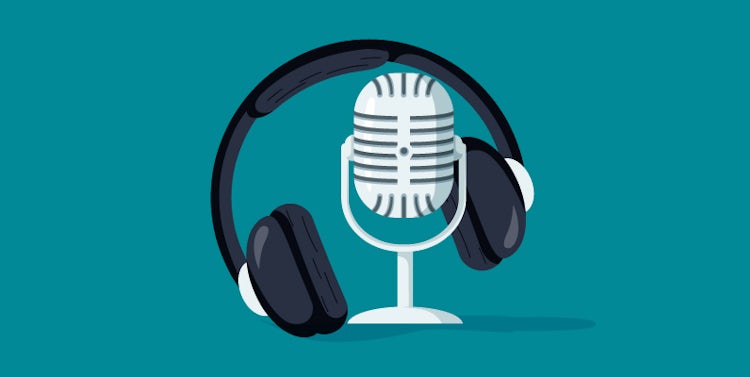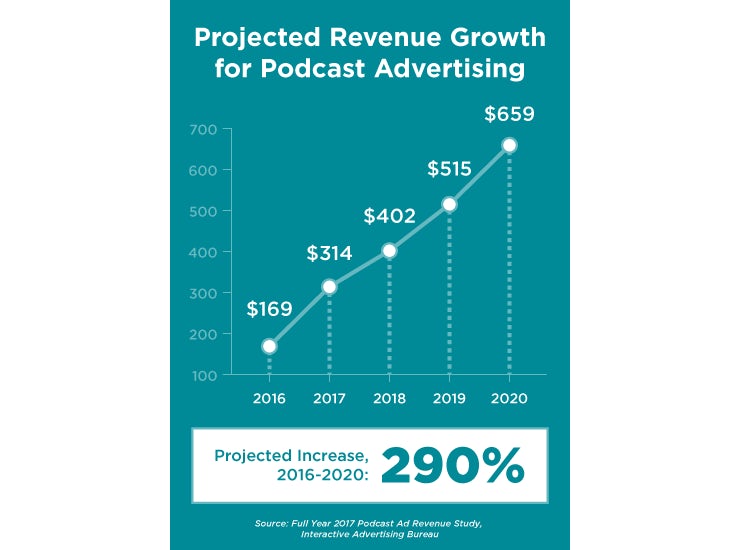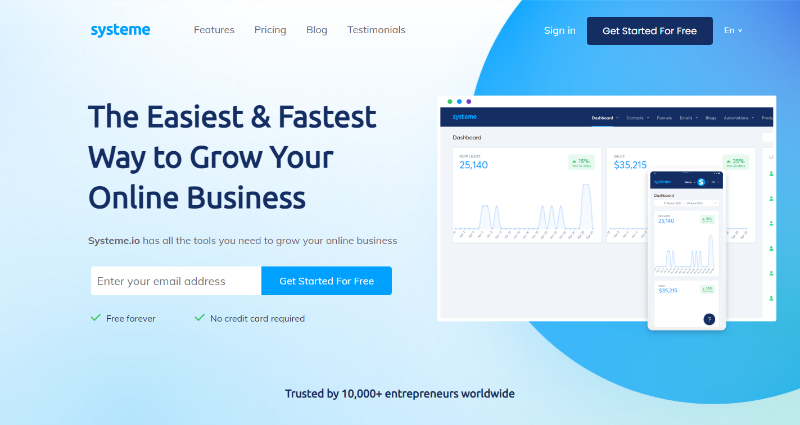Podcast advertising is a growing marketing channel, with demonstrable returns for brands that know how to use it.
Major advertisers are purchasing fewer and fewer broadcast radio ads, but that doesn’t mean audio programming is fading from the culture. Podcasts – radio’s younger, on-demand sibling – are swiftly gaining popularity with many of the demographics that marketers desire most.
Why are podcasts so popular? For one, many people listen to them on smartphones, so episodes can tag along on morning commutes, midday walks and evening jogs. Plus, there are more than 550,000 shows with topics for nearly every interest. That wealth of content has turned 73 million Americans into podcast listeners, according to recent data, and that audience is projected to grow 81% by 2022.
With an audience so large, the surge in podcast advertising comes as no surprise. In 2018, advertising on podcasts generated $402m (£331m) in revenue, and spending could hit $659m (£543m) in 2020. Such rapid growth raises an obvious question: do podcast sponsorships deliver a solid return on investment?
The answer is yes, if your business knows how to leverage the channel. But before diving into how to create an effective campaign, it’s important to explore why podcasts offer so much potential.
In 2017, global spending on digital advertising outdid TV spots for the first time. However, increased spending doesn’t automatically make it an effective medium. A reason to doubt digital advertising is that millennials, a key marketing demographic, are so selective about information that ignoring visual ads is second-nature. Additionally, ad-blocking software ensures display ads never appear for about 30.1% of internet users.
Ad-avoidance may plague many marketing channels, but not podcasts. In fact, 78% of listeners actually approve of podcast sponsorships. Why? Because the listeners make the connection that the advertising funds the content that they truly value.
Podcast listeners don’t simply approve of ads; many find them memorable and motivating. That’s according to Podcast Playbook, published by Interactive Advertising Bureau. Data in that report indicated 67% of listeners could recall products and brands featured in ads. Even better, 61% actually paid for a product or service they learned about on podcasts.
The average podcast has three slots for ads – a pre-roll, mid-roll and post-roll. A pre-roll ad greets listeners during the first 15 to 30 seconds of an episode. Mid-roll ads last 60 to 90 seconds and play halfway through an episode. A 20- to 30-second post-roll ad plays just before the closing credits.
Podcast hosts read the majority of ads, either during the flow of a show or a pre-recorded segment. Many advertisers prefer the former, as ‘live reads’ allow hosts to improvise unique advertising messages or relate products to the theme of a show. This enables ads to seem like another segment instead of a paid endorsement.
After a host reads an ad, companies must determine if it generated a positive return on investment. Unlike pay-per-click ads that capture consumer behavior in real time, podcasts don’t offer a built-in way to indicate that listeners took a desired action. However, there are reliable ways to measure the ROI that advertising on podcasts delivers, according to Forbes:
The above tools are best suited for direct response campaigns, the most common type of podcast advertising. For brand awareness campaigns, marketers can monitor social media to see if podcast sponsorships deliver a boost in likes, shares and mentions.
Advertising on podcasts may be a great way to acquire customers, but that doesn’t mean it’s easy to create an effective campaign. To get the most out of your marketing budget, consider these tips:
Schedule your ad to play during the mid-roll slot when possible. At that time, people are listening closely. This could reduce the risk of listeners fast-forwarding past your ad.
Because podcasts serve an immense spectrum of interests and audiences, you should identify shows that perfectly sync with your brand, products and services.
Running a single ad on a podcast likely won’t reveal if the show is an effective advertising option. For a more accurate view of performance, consider advertising on eight consecutive episodes to reinforce your call to action over time. Then, review the performance after your campaign concludes.
As we reviewed earlier, use promo codes and other tools to learn if listeners acted on your podcast advertising. For brand campaigns, monitor social channels for a bump in mentions, likes and shares.
Letting a host deliver your ad allows listeners to hear your offer from a personality they like and trust. As a result, warm feelings evoked by a host may carry forward to your brand.
For similar reasons to why you should let the host read the ad, you shouldn’t feel compelled to write airtight scripts. Providing a series of actionable points may work better, as this approach allows a host to personalise the ad for his or her audience. Be sure the host has in-depth knowledge about your product or brand to provide a genuine, entertaining message that is difficult to skip.
Many businesses weren’t well known when they began advertising on podcasts. SquareSpace, Zip Recruiter and Rocket Mortgages are early adopters of podcast sponsorships, and they leveraged the medium to become established brands.
One of the greatest success stories took place in 2014, when email platform MailChimp sponsored the first season of ‘Serial’, a long-form non-fiction podcast. That investment paid off when 31 million episodes were downloaded and MailChimp’s unique ad went viral.
Success enjoyed by startups has convinced Fortune 500 companies such as Delta, Discover and Wells Fargo to sponsor podcasts. Big companies are using their substantial budgets to innovate what podcast sponsorships can be.
In 2016, eBay partnered with Gimlet Media to create ‘Open for Business’, a branded podcast that explores the ins and outs of founding a company. So far, the sponsorship has paid off, as downloads have surpassed eBay’s projected goal by more than 200 percent.
Branded shows are just one development that could change the podcast advertising landscape. The next big change could be widespread adoption of dynamic advertising. This means a single ad wouldn’t play for every person who downloads an episode.
Instead, geotargeting, demographics and the time that someone downloads an episode would determine the ad that a listener hears. This flexibility allows companies to narrow the targeting of their podcast advertising spend, making the channel even more valuable.
Advertising is just one piece of the marketing puzzle. Modern businesses need dynamic leaders with a wide range of skills to help brands stand out.
You can obtain dynamic marketing knowledge in Southeastern University’s online MBA. Courses explore the nuances of marketing along with other core business functions, like accounting, finance and information technology.
Our flexible online program provides the freedom to run a business or further your career while you work toward a valuable MBA. Upon graduation, you’ll possess leadership, critical thinking and communication skills that businesses need in a global economy.
Marketing Week columnist Mark Ritson will host a new webinar providing practical advice on how to prevail in the time of Covid-19.
The coronavirus outbreak provides an opportunity for the advertising industry to tackle the issue of trust and fulfil its responsibilities to the people, businesses and economy of the UK, says AA president Keith Weed.
Consumers believe staff welfare should be a company’s first priority, while brands also have a role to play in supporting governments and wider society through the crisis.
Rather than making “big public displays”, brands should look internally to consider how the loss of the monarch is affecting their staff.
Following the death of Queen Elizabeth II, the industry is pausing plans and suspending advertising in tribute to the UK’s longest-serving monarch.
Britvic wants to tackle today’s economic challenges head-on, says commercial growth director Bruce Dallas, using innovation to explore new categories and markets.
Most respondents (71.8%) to Marketing Week’s Language of Effectiveness Survey claim their brand needs to expand its suite of marketing effectiveness analysis.
Xeim Limited, Registered in England and Wales with number 05243851
Registered office at Floor M, 10 York Road, London, SE1 7ND
